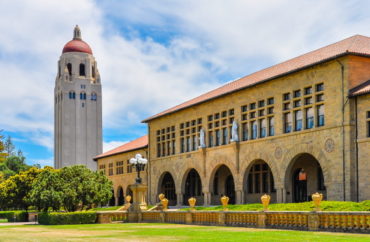
ANALYSIS: Stanford said it wants open debate, but its history and other promises say otherwise
Stanford University officials want to see a “diversity of opinions” on campus as part of their new “Inclusion, Diversity, Equity, and Access” plans.
But they won’t answer questions on how they plan to do that, particularly as its DEI plan and other projects includes initiatives that appear to support cancel culture or could limit open debate.
The Inclusion, Diversity, Equity, and Access in a Learning Environment initiative is a new strategic plan for the university.
The university wants to “create an environment where a diversity of opinions can flourish and where attempts to silence the speech of others are not tolerated” and ensure “people of diverse backgrounds and perspectives have a voice and feel empowered to participate in active, respectful, and civil discourse.”
School officials also want to “[p]rovide educational opportunities for university community members to encounter a diversity of perspectives that expand critical thinking.”
It comes after leftist law school students shouted down a federal judge in March of this year. Tirien Steinbach, the DEI law dean who appeared to berate the judge despite ostensibly being there to keep peace, has since left the university.
The resulting “free speech training” was reportedly a campus joke, as previously reported by The College Fix.
None of the five DEI leaders at Stanford contacted for comment responded. The Fix asked about specific ways Stanford would increase the diversity of opinions and how efforts to reduce bias (i.e. microaggressions) would possibly undermine the goal of open debate.
The Fix did not receive a response after multiple media inquiries over the past two weeks.
Assistant Vice President for External Communications Dee Mostofi, along with the media team, also did not respond to a Monday inquiry about specific steps to recruit center-right academics and how the university could balance open debate with its concerns about “microaggressions.” The 2021 climate survey that informed this new report included questions about microaggressions, “harmful interpersonal interactions,” and “harmful experiences.”
MORE: Stanford course studied ‘Abolishing Whiteness’
The Fix also asked if open debate could be harmed by a pending decision on a limit on research funding from the oil and gas industry.
Stanford is currently considering barring donations from oil and gas companies from supporting research at its new Doerr School of Sustainability, following demands from activists.
“Academic freedom is the very lifeblood of our institution,” the plan states. “It is the principle that lies at the heart of our endeavor to continually ask new questions, explore new avenues of inquiry, consider new alternatives, and ultimately, develop new knowledge.”
The university stated “in an inclusive academic environment, there must be freedom to pursue and disseminate knowledge without fear of reprisal or censorship.”
But while the plan appears to be open to a diversity of viewpoints, it in other places endorses a culture of cancelation for some views.
The university wants to “[d]evelop and implement a facilities framework that produces better physically and culturally inclusive buildings and facilities” and “replace” “names, symbols, and representations that have been traditionally associated with or used by the university” if “there is strong evidence that they can prevent inclusion.”
The same DEI team that produced this report also reportedly offered financial incentives for people to report “harmful” words found on campus websites as part of its “Harmful Language Initiative.”
MORE: Stanford professors flag social media content for Homeland Security
IMAGE: Jejim/Shutterstock.com
Like The College Fix on Facebook / Follow us on Twitter






Please join the conversation about our stories on Facebook, Twitter, Instagram, Reddit, MeWe, Rumble, Gab, Minds and Gettr.